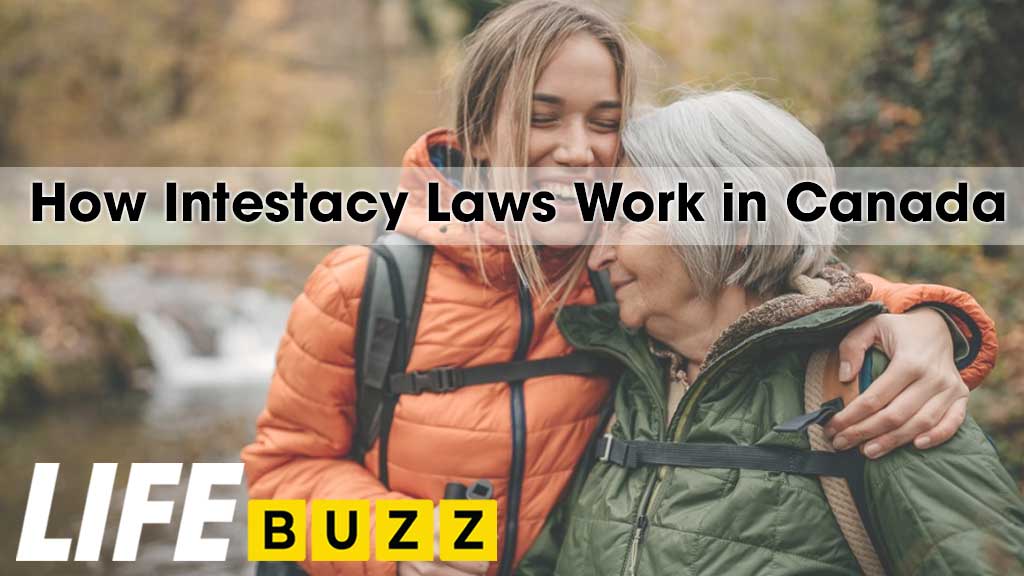The recent Scotiatrust Wills and Estate Planning Survey of Canadians over 50 shows that only 69% of the respondents have an up-to-date legal will. This situation, known as dying intestate, can have major consequences for your loved ones after you pass away. Read on to know about what happens when you die without a will in Canada, including asset distribution, costs, and how to avoid intestacy yourself.
What does dying intestate mean in Canada?
Intestacy, or dying intestate, refers to the condition of dying without a legally valid last will and testament. This means provincial intestate succession laws dictate how the deceased person’s estate will be handled, rather than instructions left behind by the individual.
While insurance policies, investments, or bank accounts with designated beneficiaries will pass directly to those individuals, most other solely owned assets will be distributed through the intestate estate. These could include property, vehicles, investments without named beneficiaries, digital assets, and personal belongings.
What happens to your estate when you die without a will?

When someone dies intestate in Canada, a family member or creditor must apply to the provincial court to be appointed as administrator (also called the estate trustee or personal representative) responsible for settling the estate.
This extra step causes delays compared to an executor already named in a will. The administrator must manage the probate process, pay outstanding taxes and debts, and eventually distribute assets based on intestacy laws. Costs from legal and administrative fees are often higher compared to estates with wills.
Each Canadian province and territory has its own intestacy legislation to determine the inheritance order when no will exists. However, these standardized formulas often don’t align with an individual’s personal wishes for their estate.
Beyond the financial, administrative, and inheritance outcome issues covered above, dying without documentation leads to other disruptions, like:
- Family disputes over asset distribution
- Guardianship uncertainties for minor children
- Disruption of business operations or succession plans
- No provision for friends or charities
- Assets caught up in foreign jurisdictions during probate
- Beneficiaries are left worse off due to tax inefficiencies
- Will contests from disgruntled heirs
Working with an experienced estate lawyer while making a legally valid will allows individuals to avoid nearly all these negative scenarios and ensure their final wishes are respected.
Who inherits if there is no will?

Canada’s intestacy laws establish a hierarchy of inheritors starting with spouses and blood relatives:
- Surviving married spouses often receive the entire estate unless children exist
- Children share estate with spouse
- Children inherit alone if no spouse exists
- Parents inherit if no spouse/children exist
- Siblings, nieces or nephews inherit if there are no surviving parents
- More distant relatives inherit if no direct kinship
The government continues searching for next of kin until finding eligible beneficiaries, with unclaimed estates eventually escheating to the provincial government.
Who cannot inherit if there is no will? Intestate succession laws exclude many individuals who might otherwise benefit from your estate. Close friends, charitable organizations, unmarried partners (in certain provinces), stepchildren not legally adopted, and caregivers receive nothing under intestate rules, regardless of their relationship quality or your verbal promises.
The specific distribution percentages and qualifying relationships vary significantly between provinces, which will be detailed below.
How do intestacy laws differ by provinces?
Each province’s unique intestacy legislation creates vastly different outcomes for similar family situations, directly affecting the inheritance of your spouse, common-law partners, and children.
Instestacy laws for spouses and common-law partners
Spousal rights under intestacy create some of the most significant variations across Canadian provinces. Provincial law often grants the spouse a preferential share of the estate, with the remainder divided between the spouse and children. For example:
- In Ontario, this preferential share increased from $200,000 to $350,000 for deaths occurring after March 1, 2021.
- British Columbia provides $300,000 when children are from the current marriage, but only $150,000 when dealing with blended families.
These preferential shares ensure spouses maintain some financial security before sharing the remaining estate with children.
The treatment of common-law partners represents one of the harshest realities of intestacy. Despite years or decades of cohabitation, common-law partners receive no automatic inheritance rights in Ontario, Quebec, and several other provinces. These partners must pursue costly legal action through dependants’ relief applications or unjust enrichment claims, adding legal complexity to an already difficult time.
Instestacy laws for children
Without designated guardians in a will, courts must determine who will raise minor children. This process involves social services investigations, family court proceedings, and potential disputes among relatives. The court-appointed guardian may not align with your parenting values or maintain important family connections you would have prioritized.
Provincial laws mandate that minor children’s inheritances be held in trust until reaching the age of majority (18 or 19, depending on the province). In Ontario, these funds are typically paid into court, creating bureaucratic hurdles for guardians needing money for the children’s care, education, or medical needs. This inflexibility can create severe financial hardship for surviving parents trying to maintain household stability.
Here is a summary table comparing the differences in intestacy laws across Canadian provinces:
| Province | Spouse (with mutual children) |
|---|---|
| Ontario (Succession Law Reform Act) | $350,000 plus 1/2 residue (1 child) or 1/3 residue (more than 1) |
| British Columbia (Wills, Estates and Succession Act) | $300,000 plus 1/2 residue |
| Manitoba (Intestate Succession Act, C.C.S.M. c. I85) | Greater of $50K or 1/2 estate plus 1/2 residue |
| Alberta (Wills and Succession Act) | 100% to spouse |
| Saskatchewan (Intestate Succession Act, The Will Act, and The Family Property Act) | 100% to spouse |
| Quebec (Civil Code of Quebec) | 1/3 estate |
| New Brunswick (Devolution of Estates Act) | Marital property plus 1/2 residue (1child) or Marital property plus 1/2 residue (more than 1 child) |
| Newfoundland and Labrador (Intestate Succession Act, RSNL1990 Chapter I-21) | 1/3 estate |
| Nova Scotia (Intestate Succession Act, RSNS 1989, c 236) | 100% estate (if the estate does not exceed $50,000) or $50,000 plus 1/2 residue (1 child) or $50,000 plus 1/3 residue (more than 1 child) |
| Prince Edward Island (Probate Act) | 1/2 estate (1 child) or 1/3 estate (more than 1 child) |
| Northwest Territories (Intestate Succession Act, R.S.N.W.T. 1988,c.I-10) | 100% estate (if the estate does not exceed $50,000) or $50,000 / matrimonial home plus 1/2 residue (1 child) or $50,000 / matrimonial home plus 1/3 residue (more than 1 child) |
| Yukon (Estate Administration Act, RSY 2002, c. 77) | 100% estate (if the estate does not exceed $75,000) or $75,000 plus 1/2 residue (1 child) or $75,000 plus 1/3 residue (more than 1 child) |
| Nunavut (Intestate Succession Act, R.S.N.W.T. 1988,c.I-10) | 100% estate (if the estate does not exceed $50,000) or $50,000 plus 1/2 residue (1 child) or $50,000 plus 1/3 residue (more than 1 child) |
If you have a spouse and children, and those children do not belong to your spouse, the rules for some provinces are:
- British Columbia: Spouse receives $150,000 and 1/2 of the remainder
- Saskatchewan: If there is 1 child, the spouse receives $200,000, and the remainder will be equally divided. If there are 2 or more children, the spouse receives $200,000 and 1/3 of the remainder.
- Alberta: The estate will be split equally between your spouse and children.
- Manitoba: Spouse receives the greater of $50,000 or half of the estate and 1/2 of the remainder
The estate, after being distributed to the spouse, will be divided equally among the children.
How can you make a legal will in Canada?

Creating a properly executed will is vital. You have three options to make a legal will in Canada:
- Holographic (Handwritten) Will: A holographic will is entirely handwritten by you and signed. It requires no witnesses. While valid, it lacks customizability.
- Lawyer-Drafted Will: Hiring an estate planning lawyer produces an airtight, customized will attuned to your unique situation. Recommended for complex estates.
- Online Will Kits: You can make a will through reputable online legal services like Willful or LegalWills. Fast and convenient, but less flexible. If you consider this route, check our guide to DIY Will Kit and Templates.
You should update your will whenever major life events occur, like marriage, separation, divorce, new children, buying property, etc. Keep the signed original copy somewhere safe, like a fireproof safe, safety deposit box, or with your lawyer. Share storage details with your executor.
Planning ahead ensures your loved ones are cared for and your wishes are respected. For more guidance, explore these related topics:
Summary
Dying without an up-to-date legal will triggers complex provincial intestacy laws, resulting in your estate potentially being handled contrary to your wishes. Having no named executor also causes delays in appointing an administrator. To ensure your estate is distributed properly, take the time to create a valid will and review it whenever your life circumstances change. Consult an estate planning lawyer if your situation is complicated. Don’t leave your grieving loved ones to deal with the problems caused by dying intestate in Canada. Protect them by making a proper will today.
Frequently Asked Questions about Intestacy in Canada
What happens to an intestate estate in Canada with no known next of kin?
If no heirs can be located for an intestate estate, it will eventually go to the provincial government after a period of time per Canada's escheat laws.
Can an intestate estate be claimed if the deceased had debts in Canada?
Yes, intestate estates with debts must still go through probate so creditors can make claims. Any debts are paid before distribution to heirs.
Is there a time limit for claims against an intestate estate in Canada?
Most provinces require claims against an intestate estate be made within a limited time period, often six months to 2 years, or the claim expires.
What order of inheritance applies on Indian Reserves for intestate estates?
For First Nations persons living on reserves, the Indian Act sets out a specific order of inheritance distribution for intestate estates.
Can an estranged spouse inherit under intestate succession laws in Canada?
Yes, a legally married spouse is entitled to a share of an intestate estate regardless of estrangement or separation in Canada.
What happens if beneficiaries dispute an intestate estate distribution in Canada?
Beneficiary disputes over the distribution of an intestate estate may need to go to court for a judge to resolve if an agreement cannot be reached.
Who is responsible for managing the investments and assets of an intestate estate?
The court-appointed administrator has a fiduciary duty to prudently manage all assets and investments of an intestate estate.
What happens to unfinished contracts when someone dies intestate in Canada?
The administrator of an intestate estate can choose to complete or terminate unfinished contracts depending on which benefits the estate.
Can someone be excluded from inheriting an intestate estate if they killed the deceased in Canada?
If a person is convicted of murdering or killing the deceased, laws prohibit them from inheriting any part of an intestate estate.
Is an intestate estate public record in Canada?
Yes, intestate estate administration processes are public records available from the probate courts in each province.
Who inherits an intestate estate if all family members die together in Canada?
If simultaneous death with no clear order of death can be established, intestate estates would go to each person's nearest kin.
How does real estate transfer work for an intestate estate in Canada?
For real estate, the administrator must obtain a Certificate of Appointment of Estate Trustee to transfer title to beneficiaries.
What happens if a will exists but all beneficiaries are deceased when the testator dies in Canada?
If all named beneficiaries in a will predecease the testator, the estate is treated as intestate and distributed per intestacy laws.
Can friends or in-laws inherit under intestate succession in Canada?
No, provincial intestacy laws do not allow inheritance by friends or in-laws of the deceased unless specifically named in a will.
What happens if a will is found after an administrator is appointed to an intestate estate in Canada?
If a valid will is found later, the probate court will revoke the intestate administration and appoint the will's executor.
Are there time limits for contesting an intestate distribution in Canada?
Yes, there are typically strict time limits, as short as 30 days in some provinces, to contest the distribution of an intestate estate.
What happens if heirs at law are unknown when someone dies intestate in Canada?
If no heirs at law can be located, the Public Guardian or Public Trustee may temporarily administer the intestate estate.
Can an executor continue selling estate property if a will is deemed invalid in Canada?
No, if a will is invalidated, the named executor has no authority. Property sales must halt until an administrator is appointed.
Is a notarized will legally valid in Canada if unsigned by witnesses when the testator dies?
No, a notarized will must still meet signing requirements. Notarization alone does not make an unsigned will valid in Canada.
Article Sources:
For a deeper look at our dedication to accuracy, transparency, and independence, please refer to the Lifebuzz.ca Editorial Policy. We take great pride in being Canada’s most trusted news source:


